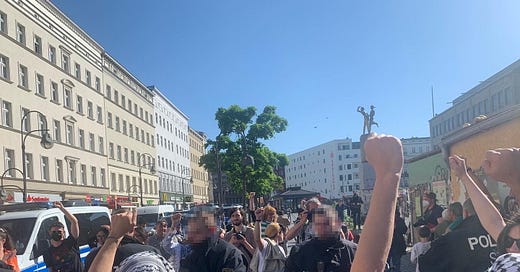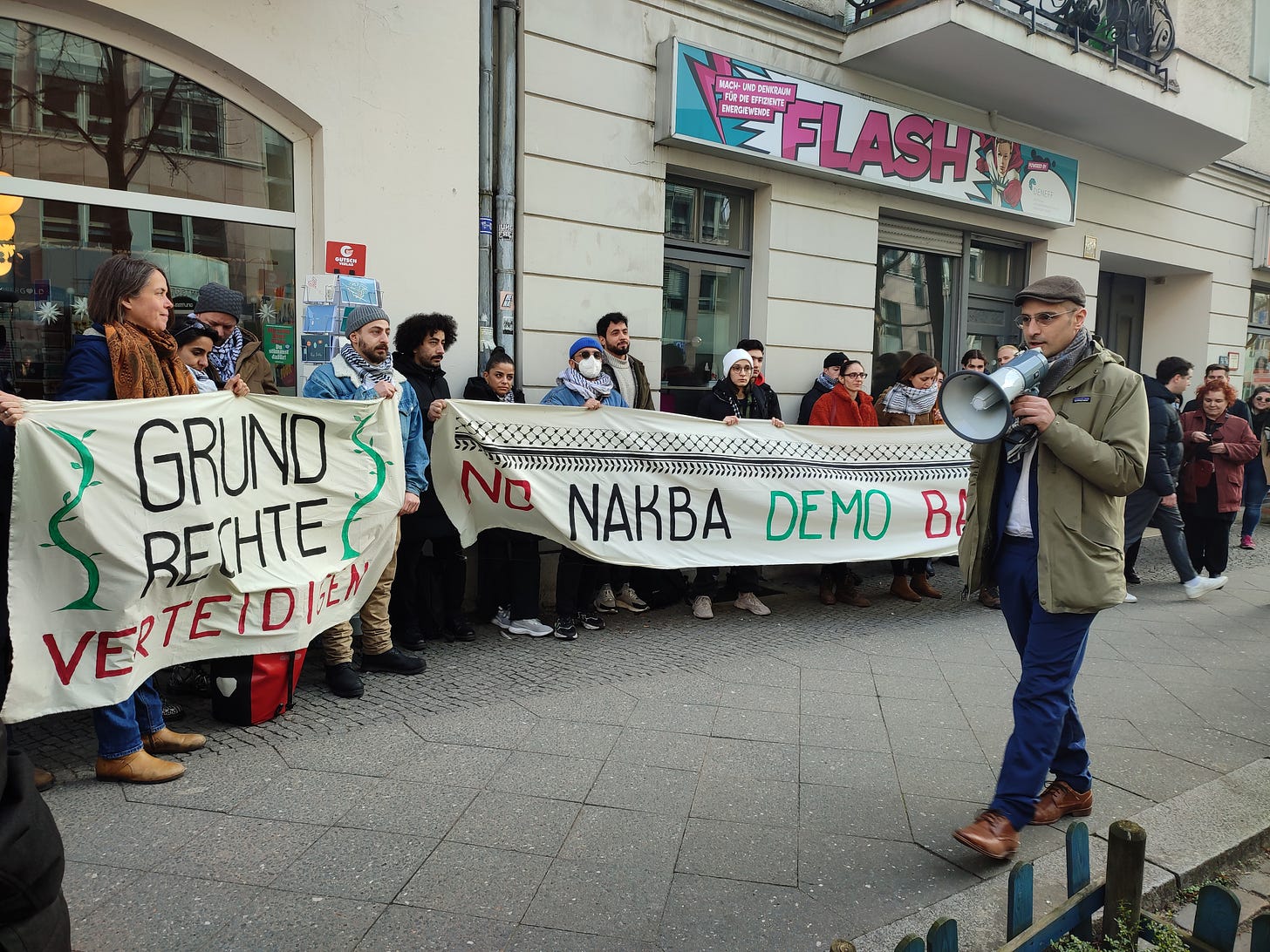In Berlin’s District Court, several activists are defending their fundamental right to freedom of expression and assembly as well as seeking to prevent a renewed ban on Nakba Day demonstrations.
At the end of April 2022, the Berlin police banned all rallies related to Palestine, including for Nakba Day, traditionally commemorating the ethnic cleansing of Palestinians during the formation of the Israeli state on May 15. Also banned was the vigil for the murder of renowned Palestinian journalist Sheerin Abu Akleh, organized by the Jewish Voice for a Just Peace in the Middle East. Many Palestinians and activists in Berlin nevertheless chose to show their rejection of this ban. Instead of demonstrating, on May 15, 2022, they gathered for a simple moment of silence, with many wearing the traditional Palestinian kufiyah, or flag.
In response, the Berlin police arrested 115 people for "participating in an illegal gathering," with 25 of those arrested received fines totalling EUR 8,269.50. While for some, the fines were dropped upon written appeal, others preferred to pay the fine to avoid "difficulties with the authorities," with many fearful for their migration status. However, 12 activists still facing fines, decided to go to court.
Different backgrounds but a common goal
These 12 activists have joined forces and published a statement on nakba-ban.org:
On 15 May 2022, following a city-wide ban on commemorations of the 74th anniversary of the Nakba, the Berlin Police unleashed a campaign of harassment against Palestinians and their supporters — arresting activists and bystanders around the city. By the end of the day, 27 activists were detained by the police and 25 were fined a total of €8,269.50. Many of us are now challenging the fines in court. The event marks a serious escalation in the Berlin government’s attempts to punish and criminalize solidarity with Palestine. It is also reflective of a wider assault on the basic democratic rights of assembly and free speech.
[...]
That is why we — activists, organizers, and citizens of Germany, the United States, Poland, Syria, and Palestine; Christians, Muslims, Jews, and non-believers alike — are organizing to fight back, supporting those persecuted on Nakba Day, building solidarity with Palestine in Berlin, and ultimately challenging Germany’s attempts to erase Palestinian historical memory.
Demonstrations in Berlin to mark the Nakba this year must be allowed to go ahead, and Germany’s attempts to criminalize solidarity with Palestine must end. We invite progressive forces from around the world to join our call.
The statement can be signed by supporters here.
Suddenly encircled without warning
Two of these activists, German student Matilda* and Palestinian refugee and student Khaled*, decided to stroll that day through Neukölln [a district of Berlin with a large Arab community]. Both wore the Palestinian Kufiyah, expressing their rejection of the police ban on Nakba commemoration.
Khaled tells me that he and Matilda went for coffee, after which they strolled around the neighbourhood, then decided to go to Hermannplatz, a popular square where many cultural and political events and activities take place. Upon arriving at Hermannplatz, he was shocked by the presence of hundreds of police officers and dozens of vehicles, in addition to a number of journalists. It appeared to him as if they were waiting for something.
"While we were walking around, we noticed that the police presence was even greater than usual," Matilda says. "Our plan was to eat shawarma with friends and meet at Hermannplatz. There were police cars and police in riot gear everywhere. But before we could leave the square again, we were suddenly surrounded by police without any warning."
"An absurd farce"
Joe*, a "Jew from the US", was traveling that day with three other Jewish friends who had heard about the ban and, since they all live near Hermannplatz, decided to check out the situation. He says: "As we approached, we saw hundreds of police, some in riot gear, standing around, but no obvious clusters of people. Occasionally the police would grab someone carrying a Palestinian flag, sometimes arresting them by force."
Joe reported very chaotic conditions. When he and his friends moved towards the centre of the square to follow the events more closely, they were suddenly arrested by the police without any warning or information. While standing around, the police “kettled” them, enclosing them from all sides without. The police had acted haphazardly during the arrests, and even families and shoppers were among those arrested.
"We were not even told why they were kettling us. Most people in the kettle were wearing a kufiyah or were probably interpreted as being Arab. Within the first minutes, a few more Arab people were pulled into the kettle, including some just after coming out of the subway and a few who had been standing outside the kettle," Matilda noted.
Arrests by the police were chaotic and sometimes violent, Khaled tells me, describing: "It was a farce since anyone could freely walk into the kettle, but they couldn’t walk out. There were about 30 of us trapped in the kettle for about two hours. Someone came to bring his girlfriend water, but the police refused to let him leave afterwards and so he was arrested with us. The police were brutal against some during the arrest, especially those who wore kufiyahs, a number of them having been forcibly dragged into police vehicles."
He went on to say, "After about two hours, they told us we had participated in an illegal assembly and we would have to come along one by one for them to register our data, either voluntarily or by force."
“Racial profiling”
Matilda noted how police reports often describe "high emotionality" at Palestine demos, which she believes highlights the Berlin police's racist view of Arab people. She asks in amazement, "Demonstrations are always emotional, but the emotionality of Germans is considered legitimate, while that of Arabs is equated with a willingness to use violence"
"Many Palestinians live and work in Neukölln. There are also two so-called ‘High Crime Areas’ here, where the Berlin police have special rights and are allowed, for example, to stop people [without reasonable cause]. It is well known that the police use the racial profiling in these areas," Matilda explains.
"I am being punished for something I did not commit"
Khaled relates, "I witnessed police violence several times in Syria, but also here in Germany. I have observed at various demonstrations police violence increases when it comes to Palestine."
"The future in Berlin does not bode well." fears Palestinian refugee Khaled, adding, "It greatly worries to think that I am being punished for something I did not even commit! Palestinian voices in Germany are being criminalized through the law."
Joe confirms what Khalid and Matilda report of police violence, saying, "I'm light-skinned, and I noticed how the police were much gentler with me than they were with people who visibly didn't look German, with darker skin."
He goes on to say, "I saw at least two instances where people carrying a Palestinian flag or a kufiyah were simply assaulted or arrested in a violent manner."
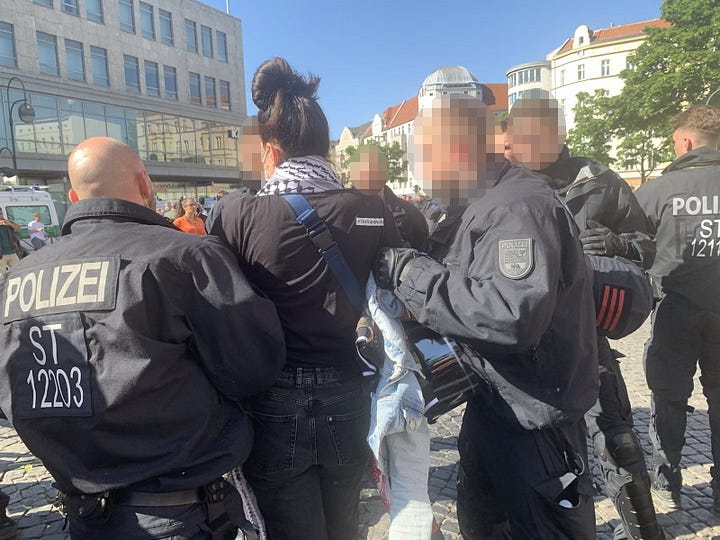
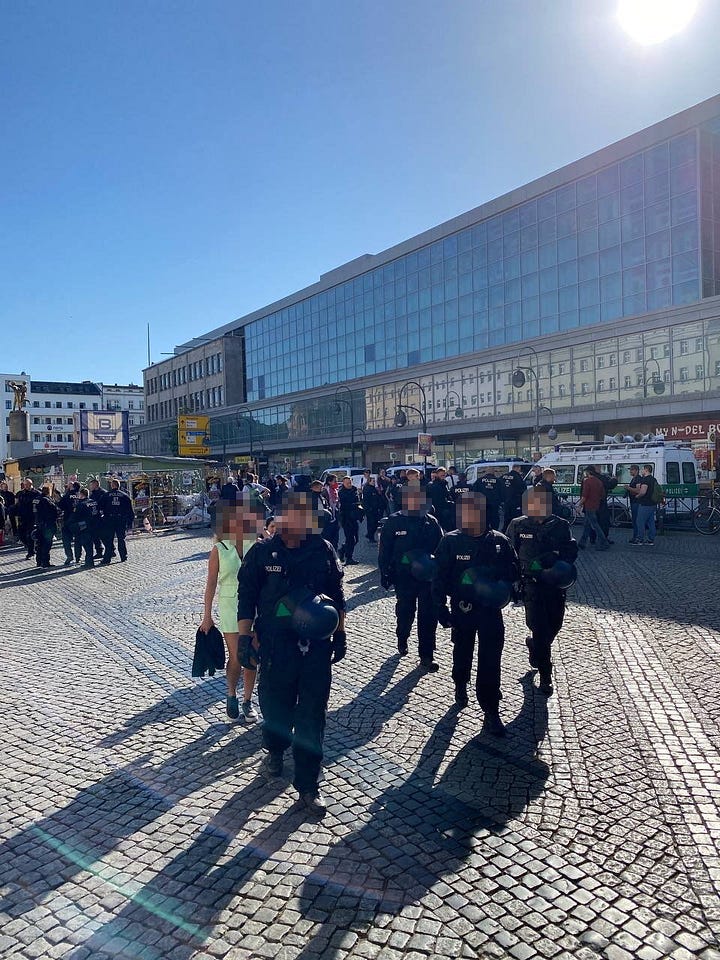
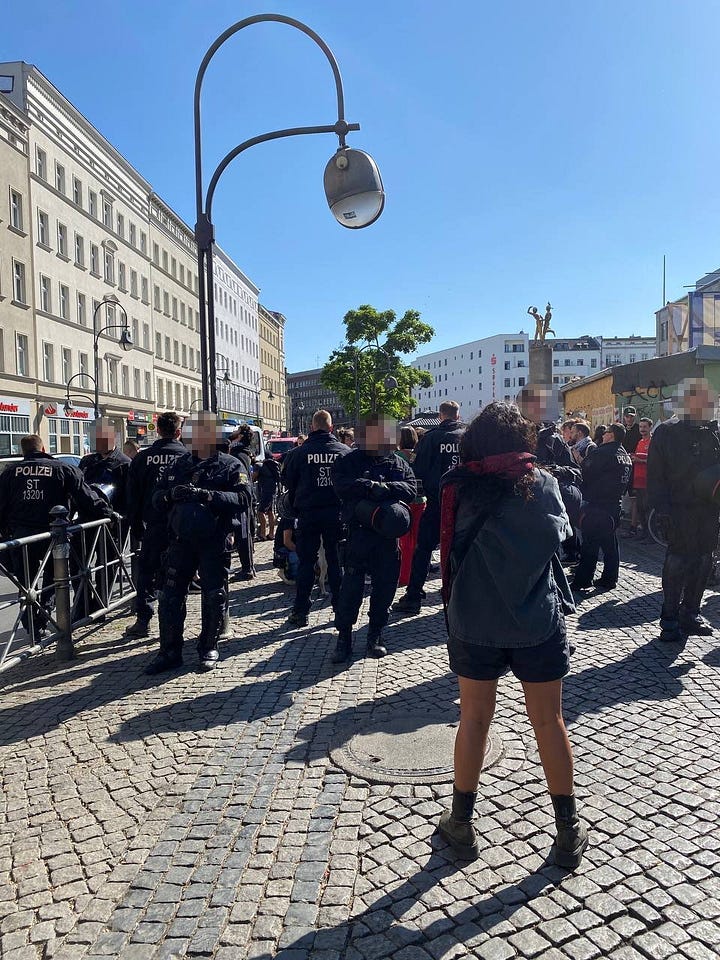
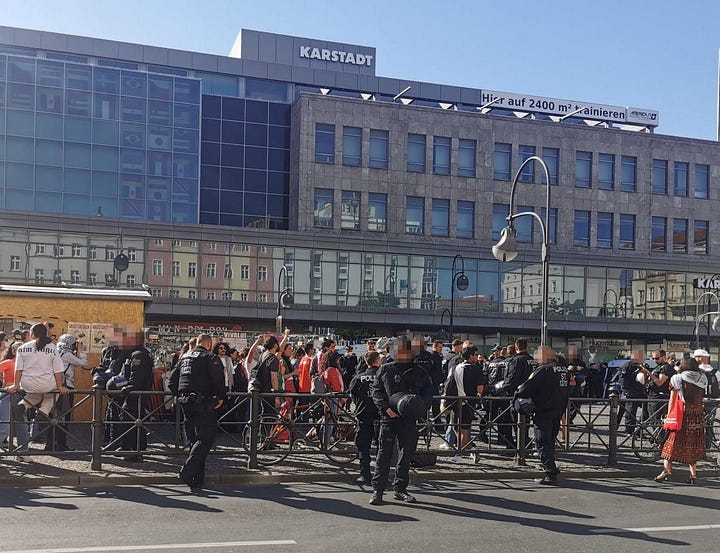
Palestinian voices banned from public spaces
The police then identified and photographed the detainees after threatening them with "coercive measures" if they did not cooperate, the activists told me. They were treated like "criminals" by the police. Those from the neighbourhood were required to remain at home for the next 24 hours, only being allowed to leave their apartments for emergencies; others were banned from entering the neighbouring districts of Kreuzberg and Neukölln until the next day.
"Officially, this [such a police order] serves to avert a danger or prevent a criminal offense (§ 29 ASOG Bln). This says a lot about the way Palestinians and those standing with them are treated in Berlin, that our presence alone is criminalized and considered a threat to [public security and order]." Matilda notes.
“This action was a show of force by the police, in an attempt at intimidation. In the end, it is the logical consequence of Germany’s prevailing policy, which tries as hard as possible to prevent Palestinian voices from entering public spaces.”
Twenty-five of the 115 people arrested by the Berlin police on May 15, 2022 for Nakba Remembrance Day were later fined for "participating in an illegal event."
Matilda, Khalid, Joe and another nine decided to challenge the fines of over 300€ per person in court as a protest against the arrests and police violence, but also to express their clear rejection of the ban on demonstrations, as Germany’s “Basic Law” guarantees freedom of expression and the right to demonstrate.
"Palestinians as an instrument of Germany’s attempt to engage with its past".
Joe shared with me his view as a Jewish activist: "Politicians across Europe intentionally equate Israel with the Jews and use racist and anti-Semitic language, but maintain strong relations with the Israeli state. They do so to avoid accusations of anti-Semitism while pursuing fascist policies, such as Hungarian President and right-wing extremist Viktor Orban, a friend of Israeli Prime Minister Benjamin Netanyahu."
He notes how under the guise of 'fighting anti-Semitism', states can practice racist policies against racialized communities, especially Muslims. He adds that Palestinians living in Germany are often used as an instrument in Germany’s Vergangenheitsbewältigung, how it comes to term with its Nazi past.
Joe explicitly recognizes that Palestinians have every right to commemorate the Nakba and express themselves politically, also noting that "Banning any criticism of Israel plays into the hands of anti-Semitic conspiracy theorists [why can't we criticize Israel? It must be a Jewish conspiracy!] and thus endangers Jews more than it helps them".
Matilda sees it similarly and notes that Israel and Judaism are increasingly equated in Germany. Additionally, geopolitical and economic interests are put above human rights and the lives of Palestinians. On the other hand, she notes growing solidarity with Palestinians, and that thanks to Palestinian activism worldwide and the documentation and publication of the crimes of the Israeli occupation, people are increasingly questioning Germany’s policy towards Israel.
She points to the formation of a remarkable alliance in Berlin, saying, "The Palestinian diaspora is growing in Germany, and Jewish groups like the Jewish Voice for Peace and the Jewish Bund are also helping a lot to make more and more Germans reconsider their position."
The fundamental right to freedom of expression and assembly
The trials began in mid-February 2023, with the first attended by many activists looking to affirm their right to freedom of expression and reject the ban on Nakba demonstrations. While Matilda and Khaled are still awaiting trial, Joe's trial ended in dismissal.
The ban on demonstrations would not promote freedom of expression in Germany, Joe argued in his court hearing, and that it was a racist mockery to permit demonstrations for openly anti-Semitic Nazis while restricting freedom of speech for commemorating the Nakba.
"I told them that I am Jewish and if they found me guilty, a German court would fine a Jew for [anti-Semitism]. I asked to explain what was meant by “demonstration,” whether it referred to the so-called “strolling” of right-wing and fascist groups a few months before, where the police did not intervene. Here the judge turned red."
During the trial, Joe wanted to read a statement he had prepared, in which he clarified his position as a Jew in Germany on the ban on demonstrations and the racism that Palestinians would experience under the guise of 'fighting anti-Semitism'. However, the hearing lasted no more than 30 minutes, and the judge ended the trial before he could speak freely.
Three other trials, of two Palestinians and a Syrian, were adjourned without a finding as the judges required further police and witness testimonies to verify several details, including whether the police really instructed those on the square to leave before they were kettled. This issue was not at all addressed in Joe's trial.
"I thought nothing would shock me anymore, no matter how unjust the decisions issued against Palestinians by the German authorities; I was definitely wrong. As a Palestinian who grew up in the Yarmouk refugee camp in Syria, and who was oppressed by the Syrian regime, I know this feeling. I had similar feelings of fear. How would I not be allowed to demonstrate! How?!" says Khaled, referring to his upcoming trial. Moreover, the logic and reasoning behind the demonstration ban scares him because it could be applied arbitrarily over and over again. The police only have to claim that there might be anti-Semitic incidents in order to ban a demonstration or rally. Khaled is not optimistic, but he will still go to trial and share what happened, exactly as it happened, "without any ifs or buts.”
*The names of the three activists have been changed to protect their identities.

